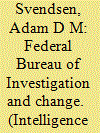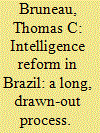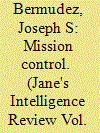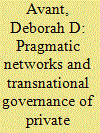| Srl | Item |
| 1 |
ID:
160654


|
|
|
|
|
| Summary/Abstract |
Palestinian uprising, ‘intifada’, aggravated the recession of 2001–2004 in Israel which dampened demand for labor in all industries except security services. We use this exogenous shock to study whether a cohort of young men who were attached to temporary jobs as security guards for unusually long periods of time during the intifada landed on an inferior career path, as compared to security guards from a pre-intifada cohort. We find that the intifada cohort had less employment mobility, were ultimately less connected with the labor market, and earned less on jobs after the security services, relatively to the pre-intifada cohort.
|
|
|
|
|
|
|
|
|
|
|
|
|
|
|
|
| 2 |
ID:
116160


|
|
|
|
|
| Publication |
2012.
|
| Summary/Abstract |
In this article, shortcomings with US domestic counter-terrorism intelligence and associated efforts since 2000 are analysed. Potential suggestions for the extended development of the Federal Bureau of Investigation (FBI) are then discussed. Some of these propositions touch on developments involving the domestic intelligence and security services of other countries, and explore their use concerning the future optimization of the FBI in the area of domestic counter-terrorism intelligence. Within the overall culture and operational approach of the FBI, today greater sustained emphasis still needs to be accorded to the 'intelligence methodology' of 'wait and watch'. Simultaneously, the FBI needs to keep moving more from mainly a post facto emphasis to more of an a priori one in its investigations. Thereby, the FBI can continue to move towards improved delivery and better meet its role as a guarantor of US national security in a timely manner as the twenty-first century progresses.
|
|
|
|
|
|
|
|
|
|
|
|
|
|
|
|
| 3 |
ID:
139509


|
|
|
|
|
| Summary/Abstract |
In our edited book, Reforming Intelligence: Obstacles to Democratic Control and Effectiveness, Steven Boraz and I argued that intelligence should be analyzed as a subset of civil–military relations. In addition to the three reasons given there—that intelligence is a monopoly of the military in most non-democratic regimes; that even in older democracies including the United States the military plays a very large role in intelligence; and that both exist to ensure national security—another can be added, at least in the case of Brazil, that while democratic civilian control has been achieved, minimal attention and commitment are given to achieving effectiveness.
|
|
|
|
|
|
|
|
|
|
|
|
|
|
|
|
| 4 |
ID:
149853


|
|
|
|
|
| Summary/Abstract |
Organisational changes to North Korea's intelligence and security services in 2016 have strengthened and consolidated Kim Jong-un's position. Joseph S Bermudez surveys the changes and what they mean for domestic threats or challenges to Kim.
|
|
|
|
|
|
|
|
|
|
|
|
|
|
|
|
| 5 |
ID:
146203


|
|
|
|
|
| Summary/Abstract |
In 2004 private military and security companies lacked effective transnational governance. Ten years later, however, an agreed-upon framework drew these services within established international law. It inspired various complementary non-binding instruments and instigated changes in government policy. Hegemonic-order theories, whether realist or liberal, would expect this change to reflect shifts in US preferences. But the United States displayed no initial interest in transnational coordination. I build an alternative explanation from pragmatism and network theory. A Swiss-led process created connections among stakeholders around the problem of regulating private military and security companies. Relatively open interactions among participants spurred original ideas, which in turn appeared useful for addressing the issue. Their usefulness, led more actors to “buy into” the process. This relational-pragmatic account offers new ways for understanding the nature and development of governance.
|
|
|
|
|
|
|
|
|
|
|
|
|
|
|
|
| 6 |
ID:
158752


|
|
|